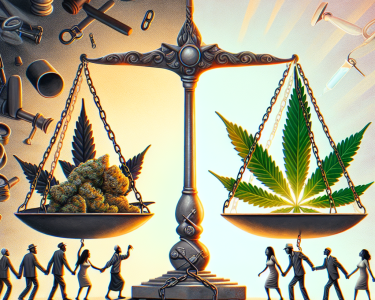In recent years, the intersection of cannabis policy and political platforms in the United States has become increasingly prominent. As the nation grapples with economic, social, and environmental challenges, cannabis legalization has emerged as a pivotal issue influencing political agendas, particularly within the framework of progressive initiatives like the Green New Deal.
The Green New Deal, introduced by progressive lawmakers, aims to address climate change and economic inequality through comprehensive reforms. While its primary focus is on environmental sustainability and job creation, the inclusion of cannabis legalization aligns with its broader goals. Advocates argue that legalizing cannabis can stimulate economic growth, create jobs, and rectify social injustices stemming from decades of prohibition.
One of the most significant legislative developments in this arena is the Cannabis Administration and Opportunity Act (CAOA). Introduced by Senate Majority Leader Chuck Schumer, along with Senators Cory Booker and Ron Wyden, the CAOA seeks to decriminalize and deschedule cannabis at the federal level. The bill also emphasizes reinvestment in communities disproportionately affected by the War on Drugs and aims to expunge certain cannabis-related offenses. This legislative effort underscores a growing recognition among federal lawmakers of the need to reform cannabis policies to promote equity and economic opportunity.
In addition to federal initiatives, state-level political parties have been instrumental in pushing for cannabis reform. The Legal Marijuana Now Party, active in states like Minnesota and Nebraska, has been a vocal advocate for the abolition of the Drug Enforcement Administration and the legalization of both hemp and marijuana. Their platform includes home cultivation rights and the expungement of past cannabis convictions, reflecting a comprehensive approach to cannabis policy reform. Similarly, the Grassroots–Legalize Cannabis Party in Minnesota has played a pivotal role in advocating for legalization, achieving major party status in 2018 after their candidate for Attorney General received over 5% of the vote. These state-level movements highlight the grassroots momentum propelling cannabis legalization onto broader political platforms.
The economic implications of cannabis legalization are substantial. The industry has witnessed significant growth, with companies like Tilray Brands Inc., Canopy Growth Corporation, and Aurora Cannabis Inc. becoming notable players in the market. As of October 15, 2025, Tilray Brands Inc. (TLRY) is trading at $1.58, Canopy Growth Corporation (CGC) at $1.365, and Aurora Cannabis Inc. (ACB) at $5.43. These figures reflect the market’s response to evolving cannabis policies and the potential for further growth as legalization efforts progress.
Political advocacy groups have also intensified their efforts to influence cannabis policy. The U.S. Cannabis Council (USCC) launched the “Legalize America” Super PAC, aiming to end cannabis prohibition and advance expungement efforts. This initiative seeks to raise the profile of cannabis as a national issue in the 2024 election and beyond, promoting responsible legalization across the United States. The formation of such political action committees signifies the strategic mobilization of resources to effect policy change at the federal level.
Bipartisan support for cannabis reform is also gaining traction. Advocacy coalitions from opposite ends of the political spectrum, such as the Marijuana Justice Coalition and the Cannabis Freedom Alliance, have united to call for President Biden to remove marijuana from the federal Controlled Substances Act. This collaboration underscores a shared recognition of the need for comprehensive cannabis policy reform that transcends traditional political divides.
The integration of cannabis legalization into political platforms is not without challenges. Opposition remains among certain lawmakers and segments of the public, often rooted in concerns about public health, safety, and societal impact. However, the momentum toward legalization continues to build, driven by shifting public opinion, economic considerations, and a growing acknowledgment of the failures of prohibitionist policies.
In conclusion, the influence of cannabis on political platforms in the United States is a testament to the evolving landscape of public policy. As the nation confronts complex economic and social issues, cannabis legalization emerges as a multifaceted solution offering economic benefits, social justice, and alignment with progressive initiatives like the Green New Deal. The ongoing legislative efforts, state-level movements, and bipartisan collaborations reflect a transformative period in American politics, where cannabis policy is increasingly recognized as integral to broader discussions about equity, sustainability, and economic growth.





